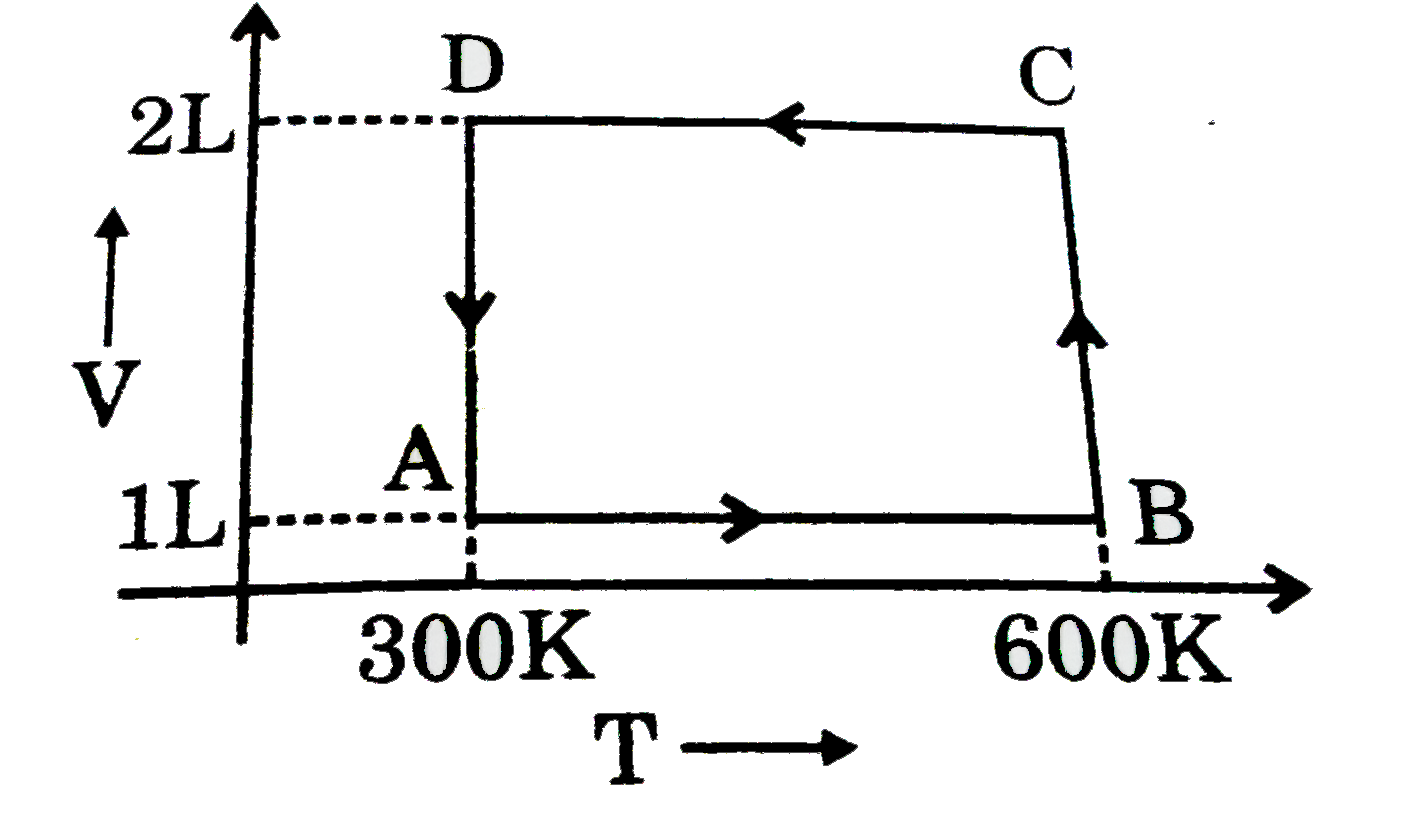2 moles of an ideal gas is compressed from (1 bar, 2 L) to 2 bar isothermally. Calculate magnitude of minimum possible work in change (in joules ). (Given : 1 bar L = 100 J, ln2=0.7)
The correct Answer is:140
To calculate the magnitude of the minimum possible work done during the isothermal compression of an ideal gas, we can use the formula for work done in an isothermal process:
W=−nRTln(V2V1)
or alternatively,
W=−nRTln(P1P2)
Where:
- n = number of moles of gas
- R = universal gas constant (approximately 8.314J/(mol K))
- T = absolute temperature in Kelvin
- V1 = initial volume
- V2 = final volume
- P1 = initial pressure
- P2 = final pressure
Step 1: Identify the given values
- Number of moles, n=2moles
- Initial pressure, P1=1bar=100J/L
- Final pressure, P2=2bar=200J/L
- Initial volume, V1=2L
Step 2: Calculate the final volume V2
Using the ideal gas law for isothermal processes, we have:
P1V1=P2V2
Rearranging gives:
V2=P1V1P2
Substituting the known values:
V2=(1bar)×(2L)2bar=22=1L
Step 3: Calculate the work done using the pressure ratio
Now we can calculate the work done using the pressure ratio:
W=−nRTln(P1P2)
Since we do not have the temperature T, we can express nRT in terms of the initial conditions:
From the ideal gas law:
P1V1=nRT
Thus,
nRT=P1V1=(1bar)×(2L)=2bar L
Converting 2bar L to joules:
2bar L=2×100J=200J
Step 4: Substitute values into the work formula
Now substituting into the work formula:
W=−200ln(12)
Using the property of logarithms:
ln(12)=−ln(2)
Thus:
W=200ln(2)
Given ln(2)=0.7:
W=200×0.7=140J
Final Answer
The magnitude of the minimum possible work done during the isothermal compression is:
140J
- n = number of moles of gas
- R = universal gas constant (approximately 8.314J/(mol K))
- T = absolute temperature in Kelvin
- V1 = initial volume
- V2 = final volume
- P1 = initial pressure
- P2 = final pressure
- Number of moles, n=2moles
- Initial pressure, P1=1bar=100J/L
- Final pressure, P2=2bar=200J/L
- Initial volume, V1=2L
Using the ideal gas law for isothermal processes, we have:
Now we can calculate the work done using the pressure ratio:
Now substituting into the work formula:
The magnitude of the minimum possible work done during the isothermal compression is:
Topper's Solved these Questions
Similar Questions
2 mole of an ideal gas is expanded from (2 bar, 1L) to 1 bar isothermally. Calculate magnitude of minimum possible work in the change ( in Joules). (1 bar =100 J)
[Given: 1 bar L=100 J]
View Solution2 moles of methane gas are compressed from (1 bar,2L) to 2 bar isothermally against constant external pressure. Calculate work done in Joules.
View Solution
Knowledge Check
Calculate the work done when 1 mol of an ideal gas is compressed reversibly from 1 bar to 4 bar at a constant temperature of 300 K
A4.01 kJB3.458 kJC18.02 kJD14.01kJCalculate the work done when 1 mol of an ideal gas is compressed reversibly from 1 bar to 4 bar at a constant temperature of 300 K
A3.46kJB−8.20kJC18.02kJD−14.01kJA certain mass of an ideal gas absorbes 80 kJ heat and gas is expended from 2 L to 10 L at constant pressure of 25 bar. What is ΔU for gas in the process ? ( 1 bar-L= 100 J)
A280 kJB−120kJC60 kJD100 kJ
One mole of an ideal monoatomic gas undergoes the following cyclic process. Calculate the magnitude of work (in cal) in a cycle. (Use: ln 2 = 0.7)

View SolutionAn ideal gas is allowed to expand from 1 L to 10 L against a constant external pressure of 1 bar. Calculate the work done inkJ.
View SolutionThree moles of the ideal gas are expanded isothermally from a volume of 300 cm3 to 2.5 L at 300 K against a pressure of 1.9 atm. Calculate the work done in L and and joules .
View Solution2 mole of ideal gas expands isothermically and reversibally from 1 L to 10 L at 300 K. then ΔH is :
View SolutionAt 25∘C, a 0.01 mole sample of a gas is compressed from 4.0 L to 1.0 L at constant temperature. What is the work done for this process if the external pressure is 4.0 bar?
View Solution
